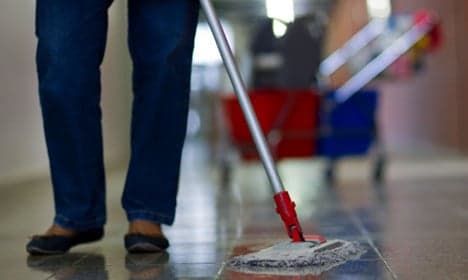Merkel's election rivals promise minimum wage

German Chancellor Angela Merkel's top election rivals, seeking to gain ground ahead of a September vote, on Thursday vowed to take on the plight of millions of working poor by pushing for a national minimum wage.
The Social Democratic Party (SPD)'s candidate Peer Steinbrück said this would promote social justice, bring Germany in line with most EU members, and stimulate demand in Europe's biggest economy.
Together with their campaign allies the Greens, the SPD pledged to introduce a minimum wage of €8.50 by next February, aiming to help especially women who make up 60 percent of low-wage workers.
The Greens' Katrin Göring-Eckardt said 6.8 million Germans are employed in a low-wage sector that is second only to those of some eastern European countries, earning on average less than seven euros an hour.
Steinbrück, a former finance minister, said studies had shown that an €8.50 minimum wage would boost German domestic demand by some €19 billion, making it "a stimulus programme in its own right."
He charged that Merkel's proposal – to allow different negotiated minimum wages by region and industrial sector – would create "a patchwork of rules across Germany" with hundreds of separate wage deals struck.
Powerful metal workers and engineering union IG Metall backed the plan, calling it "the first and most important step in reordering the labour market."
Merkel's government, which also includes the pro-business Free Democratic Party (FDP), argues that an across-the-board minimum wage would endanger jobs, pointing to Germany's current low unemployment rate of 6.9 percent.
Merkel is rated Germany's most popular politicians in most polls, and her conservative party is far ahead in national surveys, although they have lost a string of regional and city elections in recent years.
A poll this week by the Forsa institute pointed at a tight election race, placing both the ruling coalition of Merkel's conservatives and FDP, and the SPD-Greens alliance, at 41 percent.
AFP/jcw
Comments
See Also
The Social Democratic Party (SPD)'s candidate Peer Steinbrück said this would promote social justice, bring Germany in line with most EU members, and stimulate demand in Europe's biggest economy.
Together with their campaign allies the Greens, the SPD pledged to introduce a minimum wage of €8.50 by next February, aiming to help especially women who make up 60 percent of low-wage workers.
The Greens' Katrin Göring-Eckardt said 6.8 million Germans are employed in a low-wage sector that is second only to those of some eastern European countries, earning on average less than seven euros an hour.
Steinbrück, a former finance minister, said studies had shown that an €8.50 minimum wage would boost German domestic demand by some €19 billion, making it "a stimulus programme in its own right."
He charged that Merkel's proposal – to allow different negotiated minimum wages by region and industrial sector – would create "a patchwork of rules across Germany" with hundreds of separate wage deals struck.
Powerful metal workers and engineering union IG Metall backed the plan, calling it "the first and most important step in reordering the labour market."
Merkel's government, which also includes the pro-business Free Democratic Party (FDP), argues that an across-the-board minimum wage would endanger jobs, pointing to Germany's current low unemployment rate of 6.9 percent.
Merkel is rated Germany's most popular politicians in most polls, and her conservative party is far ahead in national surveys, although they have lost a string of regional and city elections in recent years.
A poll this week by the Forsa institute pointed at a tight election race, placing both the ruling coalition of Merkel's conservatives and FDP, and the SPD-Greens alliance, at 41 percent.
AFP/jcw
Join the conversation in our comments section below. Share your own views and experience and if you have a question or suggestion for our journalists then email us at [email protected].
Please keep comments civil, constructive and on topic – and make sure to read our terms of use before getting involved.
Please log in here to leave a comment.